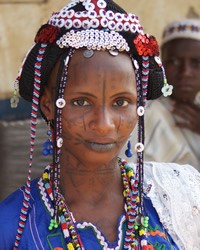As their name suggests, the vast majority of the Nigerian Fulani live in Nigeria. A smaller population lives in southern Chad. Nigerian Fulani are primarily cattle herders in the savannah region. They generally migrate between two locations, one for dry season and one for rainy season. In times of abundant rain, they prosper but can face starvation in periods of draught. The Nigerian Fulani are bound together by their language of Fulfulde and their Islamic faith. Chad became independent from France in 1960. Unfortunately, since that date Chad has experienced a series of civil wars, the assassinations and arrests of political leaders, coups and wars with Libya and Sudan. A quarter of Chad's income is aid from the UN, NGOs, France, China and the USA. International agencies consider Chad to be a failed state. Life expectancy is under 50 years old. Less than 40% of the people are able to read and write. The two official languages of Chad are French and Arabic. Chadians speak over 100 languages and dialects. In 2003 Chad became an oil exporting nation. Most of the revenue from the oil went to buying weapons and for the salaries of the Chadian military, not for the welfare of the Chadian people. A New Testament in Fulfulde became available in 2013. Only a tiny fraction of Fulani claim to be followers of Christ.
The number of cattle determines the wealth of a Fulani family. A man may have up to four wives if he can afford them. Families arrange marriages with Fulani girls marrying young. The Fulani roam the savannah to find grass and water for their cattle and to avoid harmful insects. The Fulani live in small family units in temporary homes. Due to their semi-nomadic lifestyle most Fulani children do not attend school. Children spend their days working to support their families. The Fulani are gradually losing their traditional grazing land. Local governments are encouraging the Fulani to settle in one place and take up agriculture. The Fulani resist change and wish maintain the life of their ancestors. Some Fulani are moving to cities hoping for a better life and educational opportunities for children. They often have to take menial jobs due to their lack of literacy and marketable skills.
The Fulani practice a mixture of traditional religion and Sunni Islam. Being a Muslim is a central part of a Fulani's identity. Leaving Islam will bring serious consequences for those choosing to follow Isa or Jesus. The Fulani were among the first West Africans to convert to Islam from animism.
The Fulani have only limited access to modern medical and veterinary treatment for their livestock. They have little access to schools for their children. Christian workers will need to live among the semi-nomadic Fulani and demonstrate to them the love of Christ. Portable solar cells can provide electricity to charge cell phone and small appliances.
Pray that the Few Fulani believers will find each other in order to fellowship together. Pray these Christians would learn to live in the power of Christ's Spirit, consistently experiencing the fruit of the Holy Spirit. Pray the Fulani would be able to care adequately for their families. Ask the Lord to send workers to live among the Fulani of Chad and tell them the good news.
Scripture Prayers for the Fulani, Nigerian in Chad.
| Profile Source: Joshua Project |











